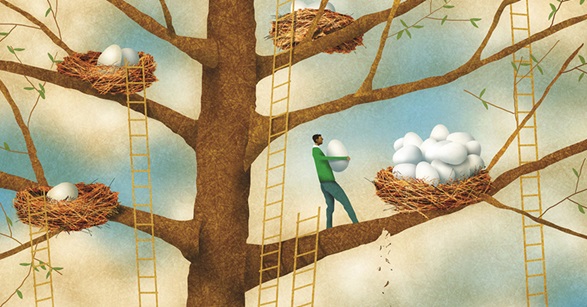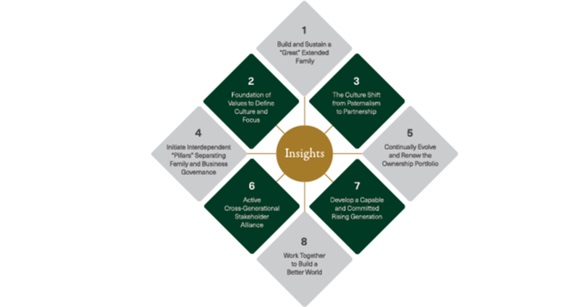- First Republic Head of Family Engagement and Governance Stacy Allred interviewed Dr. Hal Hershfield about the behavioral science behind decision-making.
- Dr. Hershfield says that we can always improve our decision-making process, even if we’ve struggled with it previously, which can in turn maximize our well-being.
- There are several research-driven methods people can use to make more successful life decisions.
In his decade of behavioral science and psychology research, Dr. Hal Hershfield, UCLA professor of Marketing, Behavioral Decision-Making and Psychology, realized that most people could better themselves with a more disciplined decision-making process. Faced with important life choices, we often inadvertently neglect important factors, or delay making a choice, until one is made for us. However, even though we’ve struggled to make decisions in the past, we can always improve. Stacy Allred, First Republic Senior Managing Director and Head of Family Engagement and Governance, agrees and believes it’s imperative to have a diverse set of tools in our cognitive toolbox that can be used together to make better decisions.
Dr. Hershfield is the author of Your Future Self: How to Make Tomorrow Better Today, which publishes in June 2023. He recently sat down with Stacy to discuss the behavioral science behind five research-driven insights that ultimately lead to more effective, thoughtful life decisions.
Consider how today’s decisions will affect your future self
Stacy Allred: While we may not face significant life decisions (e.g., whom to marry or whether to have children) very often, we all encounter important, mid-level choices more often, such as whether to take action to improve our health or pursue a career opportunity. What challenges do people encounter in making these decisions?
Dr. Hal Hershfield: One of the places that this goes awry is in people’s inability to fully recognize how they’ll feel in the future about decisions they’re making today. Research shows that people usually think they’ll feel one way about a decision, but they often don’t consider their other feelings or how long that feeling will last.1
For example, if I lose my job, I may think my life will be measurably worse, but I probably won’t account for other things that make it not as bad as I assumed. I might end up finding a better opportunity or realizing that I needed a break. In addition, Steven Levitt, economist and author, has shown that people are inclined to stay with the status quo and fail to recognize how a change may boost their well-being.2
Ask questions that drive toward what you want to optimize
Stacy: Your research shows that people are more likely to evaluate their lives in 9-ending years (29, 39, 49, etc.).3 Why do you think this is a pattern?
Dr. Hershfield: I think it’s a byproduct of our number system that we use these arbitrary age markers. But we really do — across cultures and countries, humans audit the meaningfulness of their lives as they approach new decades, while also making big decisions during that same time period.
Stacy: You’ve referred to these periods as times of “taking stock.” How can people do this evaluation and search for meaning more effectively?
Dr. Hershfield: A lot comes down to understanding what you’re optimizing for — and then asking the right questions. For example, do you want to optimize for meaning or happiness? Those may not be the same thing. A life rich with experiences may provide more meaning, but all those experiences may not be happy. It’s essential to understand your goal because it will inform your actions. If you want more satisfaction and meaning out of your career, you may take a job farther away from home. Now you commute, which reduces happiness, but maybe it’s worth it for job satisfaction.
Talk to people who’ve made similar decisions
Stacy: If you had one piece of advice for how people can make better life decisions, what would it be?
Dr. Hershfield: In Western culture, we’re taught to value being unique. Yet Dan Gilbert and his colleagues have a paper called “The Surprising Power of Neighborly Advice,” which shows that one of the best ways to make big decisions is to talk to others who’ve made them.4 We think we should know ourselves better than someone who has already done something similar. That’s why it’s so hard for younger generations to listen to older ones. But Gilbert’s research shows that the experiences of people who’ve gone before us may be a more accurate predictor of our well-being than our own simulations. It turns out that we have a hard time simulating the future and many of our simulations are subject to errors; for instance, we might think about the opening moments of an interaction but not the rest of that interaction. Using a “surrogate” — or someone who has gone before us — can eliminate some of those problems in part because surrogation doesn’t rely on faulty simulations.
Have multiple tools in your cognitive toolbox
Stacy: Even with that good advice, we know there’s not a single prescription for better decision-making; it’s more about having multiple approaches and a process. What other mental models or tools should people consider?
Dr. Hershfield: We’ve previously discussed the importance of evaluating time versus money in decisions. For example, my study with Cassie Mogilner Holmes from 2016 showed that given a choice between more time or more money, about 70% of people chose money.5 But the people who chose time ended up happier and more satisfied with their lives. That’s one factor to consider.
Stacy: What can help people maintain changes they’ve made?
Dr. Hershfield: I like the concept of an accountability partner. This works especially well for changes that require repeated decisions, such as undertaking a new exercise program. As humans, we’re incredible at making exceptions for ourselves about why we shouldn’t do something. But by telling someone your goal and checking in with them, you create a commitment that helps you stick to the change.
Recognize how better decisions can maximize your well-being
Stacy: Taking a step back, why is making better decisions so critical?
Dr. Hershfield: What’s at stake is the most important thing: our well-being. We’re great at rationalizing and making excuses and looking back and saying that what we did worked for that time. But sometimes making changes can increase our well-being now as well as later. We want to avoid ending up in a position where we look back and have regrets. And in the less extreme, it’s not always about preventing the negative but also promoting the positive. By maximizing our decision-making abilities, we can maximize our well-being across our lives.
Explore a new approach for elevating your decision-making
There’s no one right way to elevate your decision-making process, and experimenting with how to improve is a journey — not a sprint. As you explore new strategies, consider incorporating one or all of these insights:
1 Wilson, T. D., and Gilbert, D. T. (2005). “Affective forecasting: Knowing what to want.” Current Directions in Psychological Science, 14(3), 131–134.
2 Levitt, S. D. (2021). “Heads or tails: The impact of a coin toss on major life decisions and subsequent happiness.” The Review of Economic Studies, 88(1), 378–405.
3 Alter, A. L., and Hershfield, H. E. (2014). “People search for meaning when they approach a new decade in chronological age.” Proceedings of the National Academy of Sciences, 111(48), 17066–17070.
4 Gilbert, D. T., Killingsworth, M. A., Eyre, R. N., and Wilson, T. D. (2009). “The surprising power of neighborly advice.” Science, 323(5921), 1617–1619.
5 Hershfield, H. E., Mogilner, C., and Barnea, U. (2016). “People who choose time over money are happier.” Social Psychological and Personality Science, 7(7), 697–706.
This information is governed by our Terms and Conditions of Use.




